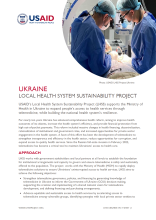Learning and knowledge sharing are fundamental to the LHSS Project. We invite you to search LHSS knowledge products and resources for the latest approaches, insights, and learning in the field of integrated health systems strengthening.
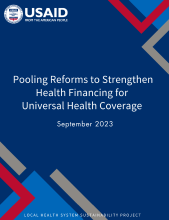
This brief focuses on how pooling arrangements—the way countries combine funding from different sources to spread the financial risk of needing to pay for health services—can be improved to accelerate progress toward UHC.
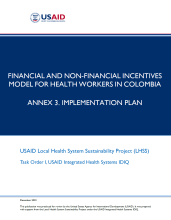
This annex presents the implementation plan for the FINFI model, which was established based on the PDCA cycle. The PDCA cycle serves as a framework for addressing and solving problems. The plan creates a roadmap that will guide the country and the MSPS in the implementation of the FINFI model. The plan also contains key elements for the implementation of the model and is organized by management level, defining key actors and objectives for each level.
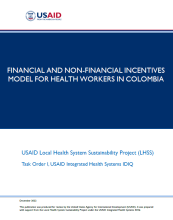
This document proposes a Financial and Non-Financial Incentives (FINFI) model to improve the quality of life and performance of Colombian human resources for health (HRH). It outlines the problems identified within the Colombian health system that precipitated the development of the FINFI model, and provides a description and analysis of the proposed FINFI model and recommendations to assist in the implementation of the model.
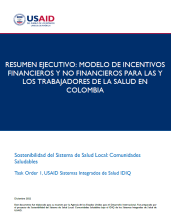
This Spanish document summarizes the Financial and Non-Financial Incentives model, including the methodology of the model and recommendations for its implementation.
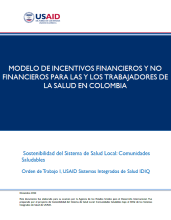
This Spanish document proposes a model of Financial and Non-Financial Incentives (FINFI) that contributes to the development and quality of life of human talent in health (HRT).
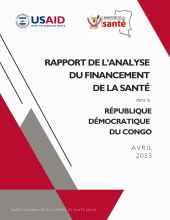
This French analysis report is conducted by LHSS DRC, with the aim to describe the situation of health financing, in particular the aspects of governance, public finances, and mainly those related to the three functions of health financing, namely: resource mobilization, pooling, and procurement of services. This report is also available in English.
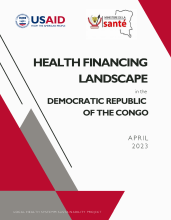
LHSS in the DRC conducted this study with the aim to describe the situation of health financing in the DRC, including aspects of governance, public finance, resource mobilization, pooling, and procurement of services. This is a retrospective and analytical descriptive study, focusing on the period from 2006 to 2023. This report is also available in French.
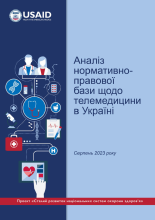
LHSS in Ukraine is supporting improvements in the legislative and policy environment so as to enable expanded access to quality medical services using telemedicine. The analysis consists of 18 chapters and covers a wide range of topics, including terms and definitions related to telemedicine, its role in provision of medical care in different types of health facilities, rights and responsibilities of patients and medical professionals, and more.
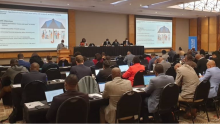
Through energetic and broad stakeholder collaboration, the country’s long-stalled effort to pass a UHC policy has gained momentum.
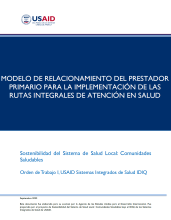
This Spanish document presents a model for strengthening the relationship of the actors involved in the implementation of two Comprehensive Health Care Routes (RIAS): the Comprehensive Care Route for the Promotion and Maintenance of Health (RPMS) and the Comprehensive Maternal and Perinatal Health Care Route (RIAMP). The model aims to ensure the successful implementation of the RIAS, which will strengthen the Colombian health system to provide comprehensive health care for Venezuelan migrants and host communities.
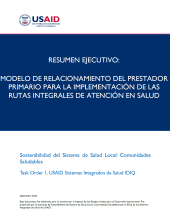
This document presents a summary of the model for strengthening the relationship of the actors involved in the implementation of the Comprehensive Care Route for the Promotion and Maintenance of Health (RPMS) and the Comprehensive Maternal and Perinatal Health Care Route (RIAMP). A full report is also available in Spanish.
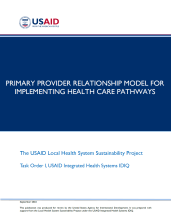
This document proposes a model to improve the relationship among stakeholders involved in the implementation of two Comprehensive Healthcare Pathways (RIAS, as per its Spanish acronym) in Colombia: the Pathway for the Promotion and Maintenance of Healthcare (RPMS, as per its Spanish acronym) and the Pathway for Maternal and Perinatal Health Care (RIAMP, as per its Spanish acronym).
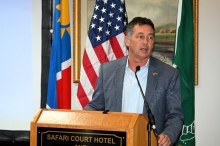
The launch of the combined Health Accounts and National AIDS Spending Assessment exercise conducted by the Ministry of Health and Social Services in Namibia aims to improve the collective understanding of both health and HIV spending in the country.
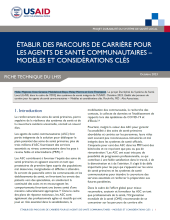
This brief in French identifies systems considerations for CHW career progression, including health workforce education and training, regulation and policy, management, and financing.

